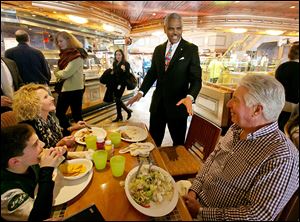
PROFIT BOOST SOUGHT AFTER ROUGH 2 YEARS
Carnival’s CEO plots new course for cruise operator
Following a rough 2 years for cruises, Carnival's new CEO is pushing through a turnaround
6/12/2014
Carnival Corp. CEO Arnold Donald talks with passengers aboard the Carnival Splendor cruise ship as he takes over a troubled, family-run business and trying to convert the world’s largest cruise line into a profitable venture. The past two years have been troublesome for the cruise line.
NEW YORK — Arnold W. Donald strolls across the Carnival Splendor’s lido deck, checking in on passengers. He cozies up, places a hand on their shoulder and asks: Are you having a blast?
He sure hopes so.
For Mr. Donald, the charismatic new CEO of Carnival Corp., the “great camaraderie” passengers find onboard his ships matters more than fancy restaurants or countless amenities. That intangible feeling isn’t easily marketed, but is crucial as he tries to fix the world’s largest cruise operator.
It’s been a rough two years for the company. First, its Costa Concordia sank off the coast of Italy, killing 32 passengers. Then an engine-room fire on its Carnival Triumph left the ship without power. For five days, passengers lacked air conditioning, hot food, and use of most toilets. Cable news was fixated.
Demand for cruises plunged. Carnival slashed prices to fill its 102 ships and announced a $700 million initiative adding emergency generators and upgrading fire suppression systems.
Passengers remained hesitant.
Then last June, Micky Arison, the son of Carnival’s founder and the CEO since 1979, stepped aside. Mr. Donald, who spent 12 years on the company’s board, was picked as his replacement.
He was an unlikely choice. Mr. Donald made a career at Monsanto Co. overseeing Roundup weed killer and later led a company manufacturing the artificial sweetener Equal.
Mr. Donald was first drawn to cruises in 1982. Not for the food or the destinations — but for blackjack.
“I counted cards,” Mr. Donald says. Dealers on ships didn’t shuffle cards frequently, making it much easier to count than in a Vegas casino. Mr. Donald’s winnings paid for that first cruise “and then some.”
“When someone says I have no cruise experience, I guess I could be funny and just say: I’ve cruised a lot,” Mr. Donald says. “The reality is business is business.”
Mr. Donald now pitches cruises as a hassle-free, affordable vacation. Guests only unpack once.
Entertainment and meals are included.
“We are actually, for a lot of people, more cost effective than visiting your relatives — and we’re probably more fun,” he says.
That affordability hurts the bottom line. Mr. Donald wants passengers to spend $20 more a day between tickets and onboard purchases — maybe a better quality alcohol, a fancy dinner, or an extra shore excursion. That would net Carnival an additional $1.5 billion a year.
Carnival could use the cash. It earned $1.08 billion last fiscal year, its lowest annual profit since 2002.
That’s only half the challenge.
Mr. Donald has shuffled executives, trying to force the company’s 10 brands to work closer together. It’s tricky. Each line — Holland America, Princess, Cunard, and Seaborn, to name a few — prospers on its unique personality. The Cunard experience, for example, is very different from Carnival.
But Carnival also needs to capitalize on its massive size. That means negotiating — for the first time — deals with one set of vendors for food, cleaning supplies, and towels. A simple concept, but until Mr. Donald took over the 10 brand heads had never even met together.
Mr. Donald, 59, grew up in New Orleans during segregation, the youngest of five children.
As a young black boy, “society was constantly telling us in subtle ways, that you’re less than, you weren’t really a part of, you can’t do this, you can’t do that.” But as a teenager, the civil rights movement was under way. Opportunities started to appear. A scholarship let him attend the prestigious St. Augustine High School.
“Three times a day, they would say: Gentlemen, prepare yourselves, you’re going to run the world,” Mr. Donald recalls.
“Nobody in my family was even in business. Period. So obviously, I’d been brainwashed,” Mr. Donald says.